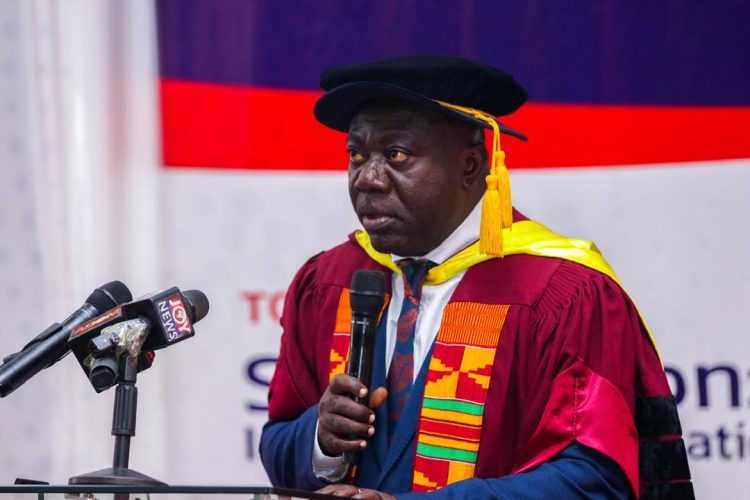In a powerful call for strategic and evidence-based development, Prof. Anthony Joe Turkson, a distinguished Professor of Probability and Mathematical Statistics at Takoradi Technical University (TTU), stressed the need for Ghana to adopt data-driven decision-making in order to achieve genuine and sustainable growth.

Prof. Turkson, who also serves as the Dean of the Faculty of Applied Sciences at TTU, made this plea during the university’s Maiden Inaugural Lecture, delivered as part of the 70th Anniversary Celebrations of TTU. The lecture, titled “Stat-a-thon: Insights, Interpretations, and Implications”, focused on the pivotal role of statistics in modern policymaking, business strategies, and scientific advancements, urging a fundamental shift in how decisions are made across the country.
Prof. Turkson emphasized that relying on guesswork or speculative assumptions in decision-making cannot provide the foundation for sustainable progress. He noted that many organizations and institutions, both public and private, often make crucial decisions without recourse to reliable data. If Ghana had consistently used data to inform its decision-making processes, he argued, the nation would have advanced much further by now.
He further suggested that voters, if they based their decisions on data-driven insights rather than emotional or unverified factors, would have contributed to a more progressive and robust democratic system, enabling the country to match the strides of more developed nations.
“Decisions grounded in data are the cornerstone of modern governance and business success,” Prof. Turkson stated. “If Ghana, as a nation, had relied on data-driven decision-making, we would not only be more advanced, but institutions of higher learning and businesses would be operating at a much higher level.”
In his lecture, Prof. Turkson also elaborated on what data-driven decision-making truly entails. He explained that it involves using empirical facts, measurable metrics, and reliable data to guide strategic decisions that align with organizational or national goals.
This approach empowers institutions to make better, more informed decisions every day, improving outcomes in both business and governance.

He referenced a 2018 study on digital transformation, which found that despite some organizations investing trillions of dollars to modernize their operations, 70% of these initiatives failed. The reason? These organizations focused too much on technology and not enough on creating a supportive data culture.
Prof. Turkson underscored the value of data for organizations across all sectors, including businesses, public institutions, and healthcare. He used his research in mortality trends in the Western Region as a case in point.
Through his study of mortality and its demographic determinants, Prof. Turkson demonstrated how crucial it is to understand and interpret demographic data, especially regarding health.
He highlighted that age is a critical factor in mortality due to cardiovascular diseases, with individuals over the age of 45 being at a significantly higher risk.
He further explained that accurate data on age is essential for effective healthcare, particularly in diagnosing and managing chronic conditions such as cardiovascular diseases.
He noted that inconsistent or inaccurate age reporting by patients can lead to challenges in understanding the full scope of these health issues, which in turn affects public health strategies and interventions.
“Accurate age reporting by patients in healthcare settings is crucial for effective diagnosis, treatment, and management of health conditions, particularly cardiovascular diseases (CVD) and comorbid conditions. Inconsistencies in self-reported ages may lead to significant challenges in understanding the true epidemiology of these health issues,” Prof. Turkson warned.
In light of his findings, Prof. Turkson called for a comprehensive digitalization of citizen data from birth to death. He advocated for the establishment of a data quality framework that would address gaps in current data systems, ensuring that critical data on age and health are more accurately captured and analyzed.
This, he argued, would enable the country to implement more targeted and effective healthcare policies focused on age-specific health risks, particularly in the Western Region, where certain health challenges are more pronounced.
The Vice-Chancellor of TTU, Rev. Prof. John Frank Eshun, congratulated Prof. Turkson for his outstanding service and exemplary contributions to the university, particularly in the field of statistics. He praised the inaugural lecture for its intellectual depth and insightful analysis, acknowledging that it set a strong precedent for future academic discourse at TTU.
“This is our first inaugural lecture, and the turnout is impressive,” he remarked. “I believe more such lectures will follow, as we have four other professors who will also deliver their inaugural lectures. Your lecture was thought-provoking, and we thank you for leading in this direction.”
Prof. Turkson’s distinguished career began in 1994 when he joined TTU as a Senior Superintendent, a time when the institution was still a second-cycle school.
Over the past 30 years, he has ascended through various academic and administrative roles, playing a pivotal part in the university’s growth and success. His research primarily focuses on statistical data analysis, survival analysis modeling, and other related fields.
He has published extensively in both national and international peer-reviewed journals and has mentored numerous students at the HND, BTech, and MTech levels.
Prof. Turkson’s recent conferment as a professor was a moment of pride for TTU, with friends, faculty, and family offering their heartfelt congratulations.
He was formally inducted into the College of Professorship, recognizing his decades of commitment to academia and his significant contributions to the field of statistics.
























































![[FREE FREE MONEY] Predict and Win a Guaranteed GH¢200 From Us EVERY WEEK](https://wordpress.ghanatalksradio.com/wp-content/uploads/2022/02/Predict-and-Win-Final-09-03-2021-218x150.jpg)
![[Predict & Win – 8th/Oct.] WIN A Guaranteed ¢200 From Us This Week](https://wordpress.ghanatalksradio.com/wp-content/uploads/2021/10/maxresdefault-16-218x150.jpg)
![[Predict & Win – 2nd] WIN A Guaranteed ¢200 From Us This Week](https://wordpress.ghanatalksradio.com/wp-content/uploads/2021/09/maxresdefault-50-218x150.jpg)
![[Predict & Win – 25th] WIN A Guaranteed ¢200 From Us This Week](https://wordpress.ghanatalksradio.com/wp-content/uploads/2021/09/maxresdefault-36-218x150.jpg)
![[Predict & Win – 18th] WIN A Guaranteed ¢200 From Us This Week](https://wordpress.ghanatalksradio.com/wp-content/uploads/2021/09/maxresdefault-23-218x150.jpg)









![[National cathedral] See full list of churches that have contributed since 2018](https://wordpress.ghanatalksradio.com/wp-content/uploads/2020/09/Ghana-National-Cathedral-GhanaTalksRadio-100x70.jpg)



